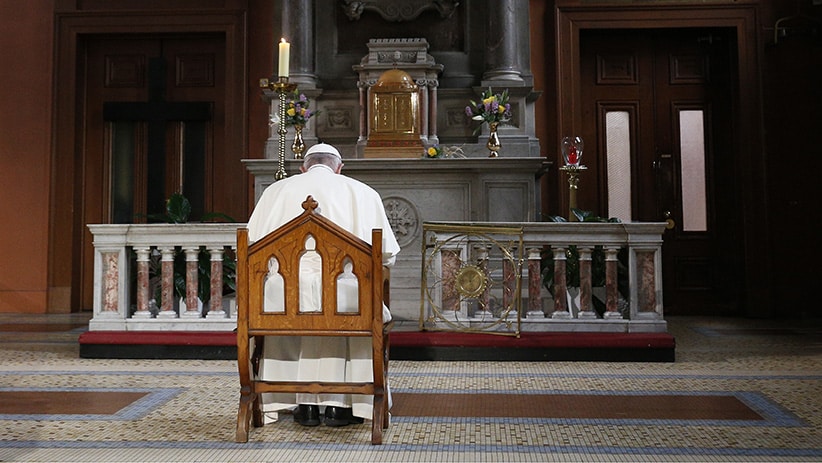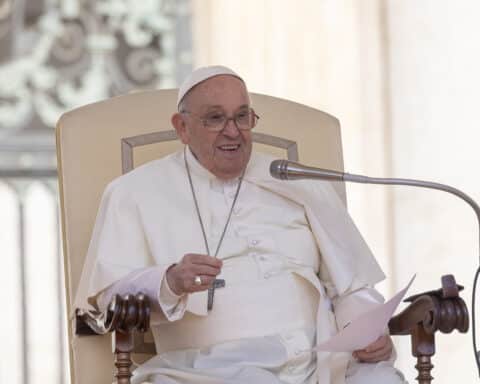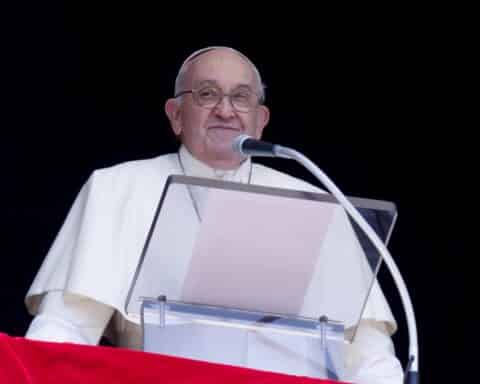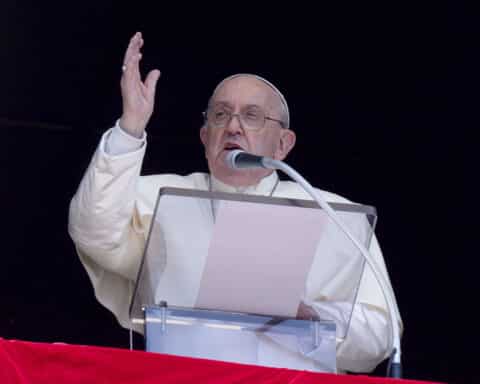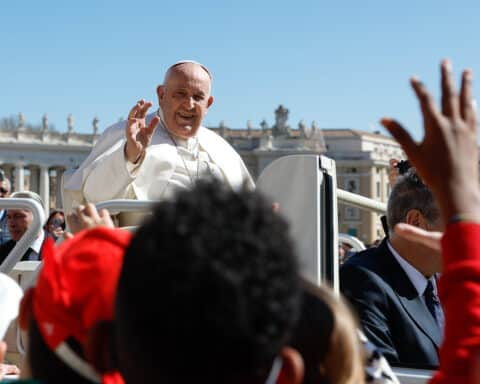The already roiled landscape of the Catholic Church’s institutional response to clergy sexual abuse through the years ratcheted up again late Aug. 25 when, in a scathing 11-page written statement, the Vatican’s former ambassador to the United States accuses Pope Francis of ignoring concerns about Archbishop Theodore McCarrick and lifting sanctions against the former cardinal years before the public became aware of abuse allegations against him.
The letter was released while Pope Francis visited Ireland, which has also been rocked with its own abuse crisis. On Saturday, the pope addressed the crisis during a Mass at Phoenix Park in Dublin.
“Some members of the hierarchy didn’t own up to these painful situations and kept silence. We ask for forgiveness,” Pope Francis said.
The letter appeared at a moment when the debate around the issue of sexual abuse was already at fever pitch. On Aug. 22, English Bishop Philip Egan of Portsmouth said an “extraordinary synod on the life and ministry of the clergy” would help to combat sexual abuse in the Church. In an Aug. 21 letter, Supreme Knight Carl Anderson of the Knights of Columbus said it is now time for priests and bishops “to come clean about what they have done and what they have failed to do.”
Viganò charges
Without offering any corroborating documentation, Archbishop Carlo Maria Viganò alleges that Pope Benedict XVI, sometime in 2009 or 2010, banned the former U.S. cardinal from publicly celebrating Mass, living in a seminary or traveling to give lectures, and ordered him to a life of prayer and penance.
Archbishop Viganò, who served as the nuncio to the United States from October 2011 to April 2016, writes in his statement that his predecessors in the nunciature, the Vatican’s embassy in Washington D.C., knew about and reported Archbishop McCarrick’s alleged abuse to successive Vatican secretaries of state, and that they did nothing.
In 2006 and 2008, while assigned to the Vatican Secretariat of State, Archbishop Viganò said he wrote memos concerning the alleged abuse, and that he learned of the reported sanctions around the time that he was transferred to the Governorate of Vatican City State.
Archbishop Viganò, 77, a vocal critic of Pope Francis and a controversial figure in Vatican politics, said he learned about the alleged sanctions from the former prefect of the Congregation for Bishops, and that he personally informed Pope Francis about them in June 2013. He said the pope failed to act.
“He knew from at least June 23, 2013, that McCarrick was a serial predator,” writes Archbishop Viganò, who also called on Pope Francis to “set a good example” and resign along with the cardinals and bishops who the archbishop said covered up Archbishop McCarrick’s alleged abuse.
The claims made in the 7,000-word statement — which Archbishop Viganò called his “testimony” — were seized upon by many longtime critics of Pope Francis, some of whom took to social media over the weekend to demand accountability and the pope’s resignation. At no point does the memo from Archbishop Viganò say Pope Francis was aware of the allegations of sexual misconduct against McCarrick involving minors, which came to light in June 2018 and resulted in the pope removing McCarrick from ministry and the retired archbishop surrendering his membership in the College of Cardinals.
Speaking aboard the papal plane from Dublin to Rome on Aug. 26, Pope Francis declined to address the former nuncio’s claims. The pontiff said people can make up their own minds about the statement.
“I read the statement this morning, and I must tell you sincerely that, I must say this, to you and all those who are interested: Read the statement carefully and make your own judgment,” Pope Francis said, adding that the statement “speaks for itself.”
On Sunday, Archbishop Viganò told CBS News that he had no agenda and was just stating facts “to combat the grave situation in the Church, to protect the Church and also to stop future abuse.”
Question of sanctions
In the United States, the archbishop’s statement provided another flashpoint in the clergy abuse scandals that have engulfed the American Catholic community since revelations came to light that Archbishop McCarrick, the former cardinal-archbishop of Washington, D.C., is alleged to have sexually abused seminarians and minors.
The statement also created new scrutiny for Cardinal Donald Wuerl, the current archbishop of Washington, D.C., who is already dealing with the fallout from the Pennsylvania grand jury report this month that raised questions regarding how he handled clergy sex-abuse cases during his tenure as bishop of Pittsburgh, from 1988-2006. The Diocese of Pittsburgh noted Aug. 22 that it was removing Cardinal Wuerl’s name from a high school in the diocese.
In his statement, Archbishop Viganò said he mentioned the reported sanctions against then-Cardinal McCarrick to Cardinal Wuerl, and that based on the cardinal’s response, “it was immediately clear to me that he was fully aware of it.”
Chieko Noguchi, a spokeswoman for the Archdiocese of Washington, D.C., provided a statement to Our Sunday Visitor disputing the archbishop’s claims.
“In spite of what Archbishop Viganò’s memo indicates, Cardinal Wuerl did not receive any documentation or information during his time in Washington regarding any actions taken against Archbishop McCarrick,” Noguchi said.
Archbishop Viganò said he discussed the sanctions in a 2011 meeting with then-Cardinal McCarrick, and that the cardinal, “muttering in a barely comprehensible way, admitted that he had perhaps made the mistake of sleeping in the same bed with some seminarians at his beach house, but he said this as if it had no importance.”
Some observers note that then-Cardinal McCarrick, during the timeframe when Archbishop Viganò said the sanctions were in effect, several times publicly celebrated Mass, including at St. Peter’s Basilica. Still other observers have pointed out that then-Cardinal McCarrick may simply have ignored whatever sanctions may have been placed upon him.
The pope’s defenders cast doubts on the statement and cited a 2014 memo that Archbishop Viganò wrote in an effort to suppress a Church investigation into alleged sexual misconduct by former Minnesota Archbishop John Nienstedt. Following his 2015 removal, Archbishop Nienstedt, had engaged for a time as an independent contractor for and attendee of events of the California-based Napa Institute, which has been linked to Archbishop Viganò’s letter.
On Aug. 27, Timothy Busch, chairman of the board and co-founder of the institute, spoke with The New York Times about Archbishop Viganò’ having shared the letter with him two weeks before its Aug. 25 release. On Aug. 15, the Napa Institute issued a statement that Archbishop Nienstedt had “stepped aside from his responsibilities with the Napa Institute effective immediately.” The statement noted that he had never been an employee, officer, director or chaplain of the institute, but also that they had “been advised that there are no restrictions on Archbishop Nienstedt’s ministry.”
In the same statement, the institute announced plans for an October conference in Washington, D.C., to gather lay leaders “to chart a new way forward that is both faithful to the Church’s hierarchical structure and committed to holding Church leadership accountable.”
The two men’s records
Donna Doucette, the executive director of Voice of the Faithful, an advocacy group for clergy sex-abuse victims, told OSV that Pope Francis, while not perfect and having made mistakes on the issue, has taken positive steps over the years to remove bishops who abused minors or failed to hold their priests accountable for abuse.
“Any bishop who covered up sex abuse should resign, and the pope should accept their resignation,” Doucette said. “That said, if Pope Francis was one of those bishops who actively covered up credible accounts of clergy sex abuse, we would apply the same standard.”
Terry McKiernan from BishopAccountability.org, a nonprofit organization that tracks clergy sex-abuse cases in the United States, told OSV that while he believes Archbishop Viganò has “an axe to grind,” he added that there still should be a thorough investigation into what the pope and bishops knew about McCarrick, and when they knew it.
“I hope this puts additional pressure on Pope Francis to be more aggressive on the issue,” McKiernan said.
Archbishop Viganò has been a lightning rod in Vatican politics. In 2012, some of the archbishop’s letters were published in the “Vatileaks” scandal. In those letters, he asked not to be transferred to Washington, and he claimed he was being punished for exposing corruption in the Church.
In 2016, Pope Francis replaced Archbishop Viganò, who had reached retirement age, as nuncio to the United States. Archbishop Viganò’s role in arranging for the pope to meet Kim Davis, the Kentucky clerk who refused to issue marriage licenses to same-sex couples, drew criticism in the wake of the 2015 U.S. visit during which the face-to-face meeting occurred.
In his letter, Archbishop Viganò accuses some prelates who are close to the pope of belonging to a “homosexual current in favor of subverting Catholic doctrine on homosexuality.”
Cardinal Daniel N. DiNardo of Galveston-Houston, president of the U.S. Conference of Catholic Bishops, said in an Aug. 27 statement that he wants an audience with Pope Francis to discuss the USCCB’s earlier-announced plans for a full investigation into the McCarrick case and other matters.
“I am confident Pope Francis shares our desire for greater effectiveness and transparency in the matter of disciplining bishops. We renew our fraternal affection for the Holy Father in these difficult days,” Cardinal DiNardo said.
The National Review Board, the body established in 2002 to advise the bishops on combatting sexual abuse, noted in a statement the following day that the overwhelming majority of current bishops take the issue seriously and adhere to the standards the bishops have set for themselves.
“However,” they wrote, “every time one bishop fails to act, the entire episcopate is tainted. It is time for the laity to assume courageous leadership to help the Church respond and to heal and for the bishops to listen carefully to our recommendations.”

